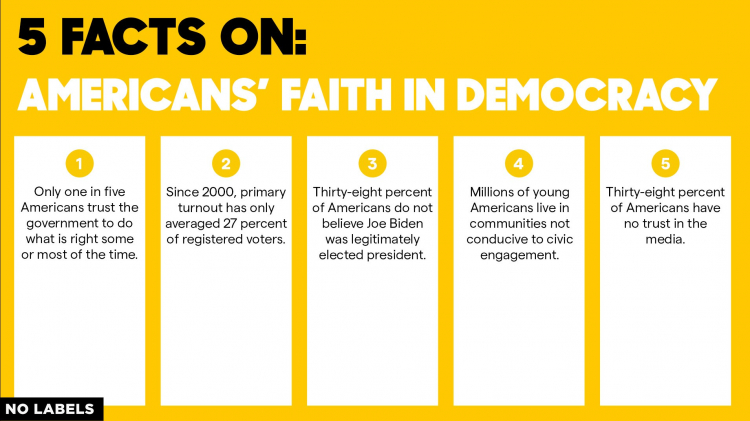Five Facts on Americans' Faith in Our Democracy

Ahead of next year’s presidential elections, a series of alarming trends have begun to emerge showing not only the public's wariness about the political process but also about foundational institutions that have historically held up our democracy. To better understand the depth of this erosion, we can look at Five Facts that shed light on Americans’ faith in our democratic process.

- Only one in five Americans trust the government to do what is right some or most of the time.
The Pew Research Center, Gallup, and other research organizations often conduct polls on public trust in government. Comparing the percentage of Americans who say they trust the government in Washington to do what's right "just about always" or "most of the time” shows that there has been a notable decline in the past 50 years – in 1964, 77 percent of Americans felt that way. By 2022, Pew found that number had declined to only 21 percent.
- Since 2000, primary turnout has only averaged 27 percent of registered voters.
Primary elections have an enormous impact on the election by determining the major party candidates most Americans end up voting for. Because primary voters tend to be more ideologically extreme than the general electorate, low participation rates in primaries can fuel more extreme candidacies. Yet since 2000, only slightly more than a quarter of the electorate has participated in the primaries on average. In 2020, for example, 240 million people were eligible to vote in the 2020 presidential election and about 158 million cast ballots – 66.1% of the overall electorate. However, the percentage of Americans who participated that year in party primaries was a much smaller 33 percent of the electorate.
- Thirty-eight percent of Americans do not believe Joe Biden was legitimately elected president.
Concerns about gerrymandering, voter suppression, or allegations of fraud have eroded faith in the democratic process on both sides of the aisle. Donald Trump helped fuel false allegations that he lost a rigged election in 2020, which drove some to storm the Capitol on January 6 – and many still believe those claims. According to recent polling by CNN, more than one in three Americans believe President Biden’s 2020 victory was not legitimate – despite more than 60 court cases—many overseen by judges appointed by former president Trump, that rejected the Trump campaign’s stolen election. Democrats have also contested the democratic process – Georgia Democratic gubernatorial candidate Stacey Abrams refused to concede her 2018 race to Governor Brian Kemp over claims of voter suppression. A federal judge also refuted these claims.
- Millions of young Americans live in communities not conducive to civic engagement.
Alexis de Tocqueville once observed that America's civil society and its myriad associations and organizations were a bedrock of its democracy. Yet researchers for decades have tracked a decline in overall participation or membership in the kinds of civic organizations, clubs, and local groups that can drive community engagement and democratic participation. According to researchers Matthew N. Atwell, John Bridgeland, and Peter Levine, 30 percent of urban and suburban youth and 60 percent of rural youth now live in so-called ‘civic deserts’ – communities where citizens do not have consistent opportunities to engage in civic or political life. According to the authors: “The continued decline in a wide range of important indicators of civic health and connectivity threatens our prosperity, safety, and democracy.”
- 38 percent of Americans have no trust in the media.
The media plays a critical role in a functioning democracy, often termed the "fourth estate." Trends in trust in media, perceptions of media bias, and the fragmentation of media sources (echo chambers) can be significant indicators of how informed and trustful citizens are of the democratic process. Yet an October 2022 poll from Gallup showed that only 34 percent of Americans have a “great deal” or “fair amount” of confidence in the media, less than the percentage who have no trust in the media. Concerningly, the poll found that only 14 percent of Republicans and 27 percent of independents trust the media.
No Labels is an organization of Democrats, Republicans, and independents working to bring American leaders together to solve problems.





